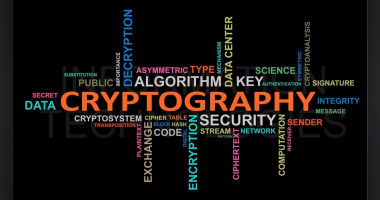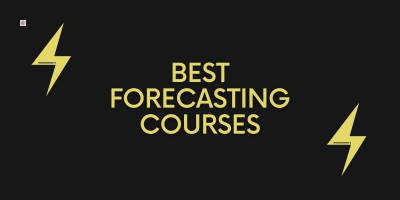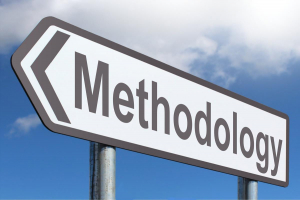Top 10 Best Online Religion Courses
Religion is a broad phrase that incorporates all spiritual, transcendental, and faith-based belief systems, as well as the rituals, traditions, values, and ... read more...practices that accompany them. Religion studies is a rich and exciting field since it interacts with a wide range of topic areas. For students of all backgrounds interested in the study of religion, there are a plethora of online course possibilities. Here are the best online Religion courses that Toplist offers you.
-
This course explores Western Christianity's astonishing evolution from its early suffering under the Roman Empire in the third century to its global expansion with the Jesuits of the early modern world. With a large cast of individuals, it explores the dynamic and diverse character of a religion. It encounters Perpetua and her martyrdom in Carthage, Augustine the bishop's efforts in North Africa, the passion of Celtic monks and missionaries, the Crusades' ferocity, Brigit of Sweden's visions, and the shattering of Christianity by Martin Luther's protest. It hears the voices of great theologians as well as those who have been labeled heretics by the Church, a striking reminder that the history of Christianity is littered with opposing visions of reform and goals, powerful critiques of corruption and venality, and exclusion of the defeated. Pogroms and expulsions are part of the turbulent history of Christian contact with Jews and Muslims, but so are the amazing ways in which Jewish and Islamic scholarship altered the Western culture.
In the West, Christianity was fashioned in the crucible of conflict and turbulence, yielding both creativity and violence. It resonated with pleas for God's world to be transformed, it inspired the most magnificent art and architecture, but it also displayed the destructive potential of the cross-sword union. The course takes students on a trip through the emergence of the West as a branch of Christianity, as well as a chapter in a larger saga. It's a journey that's changed the course of history.
This course offers:
- Flexible deadlines: Reset deadlines in accordance to your schedule.
- Shareable Certificate: Earn a Certificate upon completion
- 100% online: Start instantly and learn at your own schedule.
- Beginner Level
- Approx. 46 hours to complete
- Subtitles: Arabic, French, Portuguese (European), Italian, Vietnamese, German, Russian, Turkish, English, Spanish, Romanian
Course ratings: 4.8/5
Enroll here: https://www.coursera.org/learn/western-christianity-200-1650
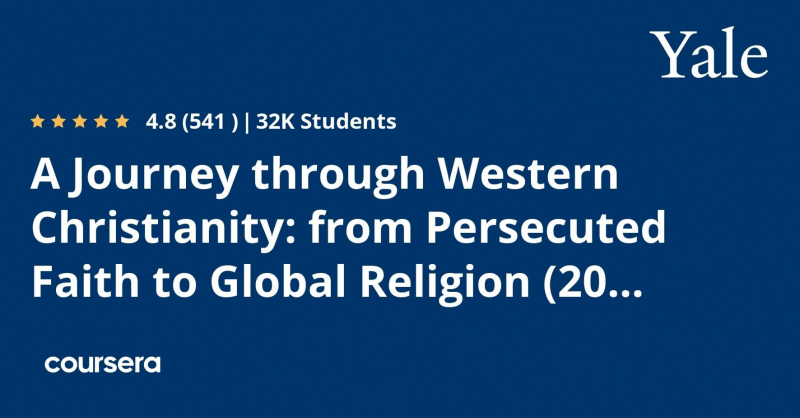
coursera.org 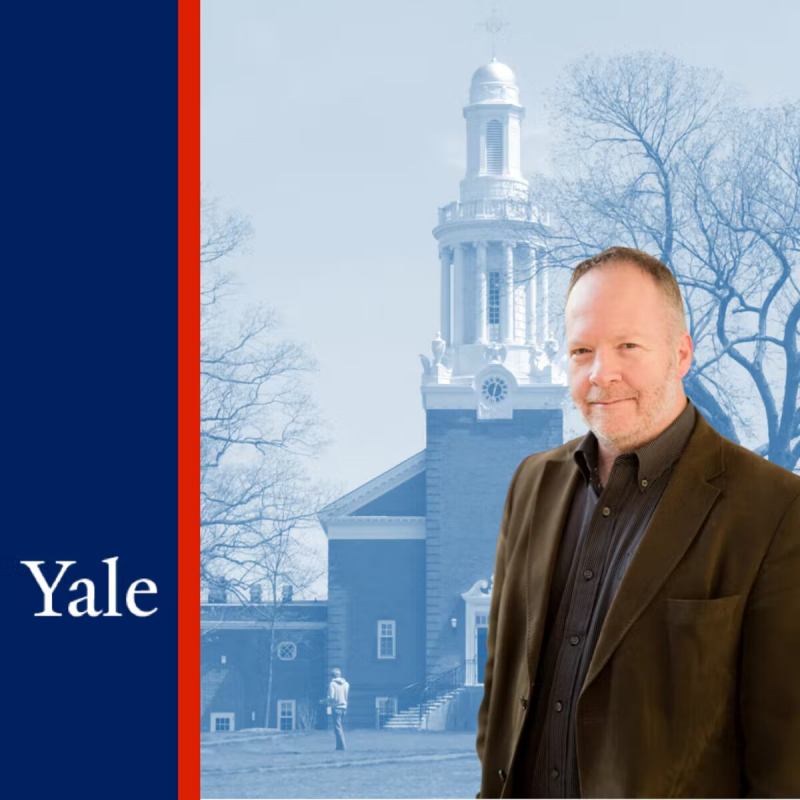
coursera.org -
Modern and Contemporary Art and Design Specialization is one of the best online religion courses. This Specialization will teach you about historical art. You'll journey behind the scenes to examine artworks up close and into studios to hear directly from artists, designers, curators, and others through unique films and audio. Anyone interested in learning more about modern and contemporary art should enroll in this Specialization. Enroll to receive invitations to virtual events, exclusive access to MoMA resources, and the opportunity to discuss ideas with a global learning community.
Start with Modern Art & Ideas to study how artists have responded to social challenges and drew inspiration from their surroundings throughout the last 150 years. Then, go into Seeing Through Photographs, which takes you on a journey through photography from its beginnings in the mid-nineteenth century to the present day. By introducing ideas, methodologies, and technology that inform the creation of images, this course bridges the gap between seeing and fully understanding them.
What Is Contemporary Art? is a collection of artworks created since 1980. The works in this course range from 3-D–printed glass and fiber sculptures to factory performances, and they introduce you to the different materials, motivations, and methods used by artists today. Complete the Fashion as Design Specialization and look into the decisions you make about fashion in terms of expression, sustainability, labor methods, identity, and more. Learn from designers who work with clothes on a daily basis—and, in some cases, are redefining them for the future.This course offers:
- Flexible deadlines: Reset deadlines in accordance with your schedule.
- Shareable Certificate: Earn a Certificate upon completion
- 100% online: Start instantly and learn at your own schedule.
- Beginner Level: No prior knowledge of art or design is required.
- Approx. 7 months to complete
- Subtitles: English, Arabic, French, Portuguese (European), Greek, Italian, Portuguese (Brazilian), Vietnamese, German, Russian, Turkish, Spanish, Persian, Hungarian, Serbian
Course ratings: 4.8/5
Enroll here: https://www.coursera.org/specializations/modern-contemporary-art-design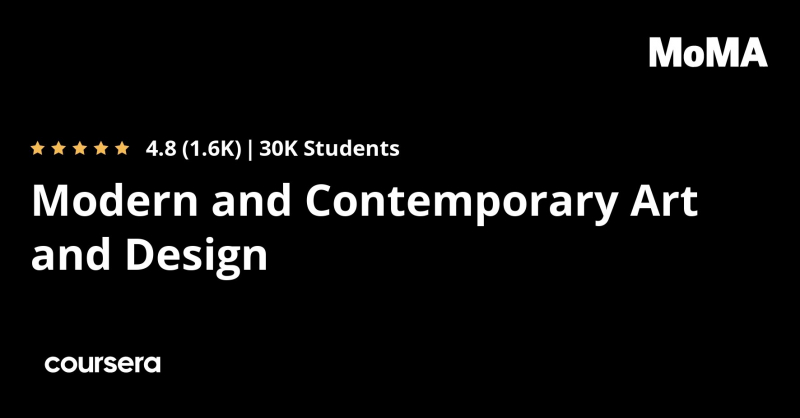
coursera.org 
coursera.org -
Learn what motivates restive Muslim youth from Tunis to Tehran, what political stances Islamists from Mali to Chechnya are fighting for, where the apparent infatuation with Islamic law originates from, where secularists have vanished to, and whether speaking of an Islamic state makes sense.
Since 2009, there has been a resurgence of popular dissatisfaction across much of the Muslim world. Secular, but often authoritarian and inefficient autocracies have been challenged or driven out. At the same time, the numerous Islamic Republics have struggled with internal turmoil, economic collapse, and social deterioration. Existing constitutional structures are being challenged across Muslim territories, often violently.
This course offers a survey of constitutional concepts and institutions that have emerged in mostly Muslim countries since the mid-nineteenth century, with an emphasis on the individuals who have dominated this discourse and impacted its outcomes. You will only look at the enormous body of classical texts on the Islamic state in order to comprehend the current discussion, and you will focus on legal and political changes in the twentieth and twenty-first centuries.
This course offers:
- Flexible deadlines: Reset deadlines in accordance with your schedule
- Shareable Certificate: Earn a Certificate upon completion
- 100% online: Start instantly and learn at your own schedule.
- Beginner Level
- Approx. 40 hours to complete
- Subtitles: French, Portuguese (European), Greek, Russian, English, Spanish
Course ratings: 4.8/5
Enroll here: https://www.coursera.org/learn/muslim-world
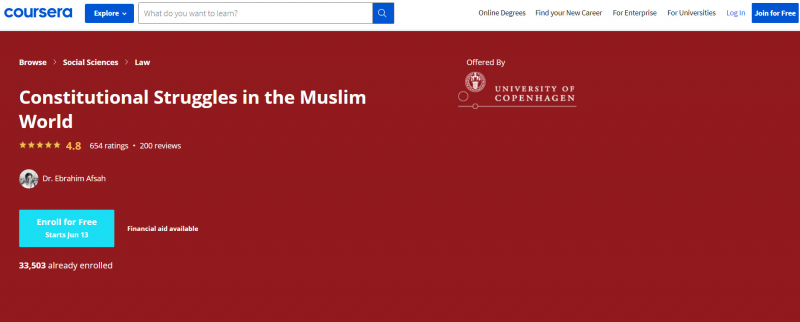
coursera.org 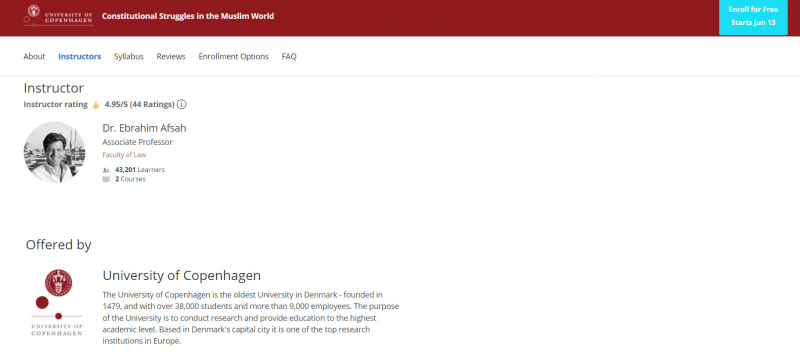
coursera.org -
What is the state of international power relations, and how can global peace and stability be preserved? This course introduces you to some of the most important theories of international relations, demonstrates how the global order is evolving and analyzes how various international and regional institutions contribute to global peace and security. You'll learn about research findings on international organizations' and actors' capacity to help prevent or end violent conflict, what techniques are used to negotiate accords, and how the best foundations for long-term peace are built. It will also look at the European Union's involvement in diplomacy and efforts to avert violence, as well as the North Atlantic Treaty Organization and the African Union's commitment to the prevention of conflict and war.
You'll look at the United Nations Security Council and examine how its membership could be changed to better represent the current global order's power dynamics. You will grasp essential concepts and get insights into how the academic study of international relations and international organization contributes to the search for global stability and peace in practice through quizzes and exercises that test your understanding of these areas.
This course offers:
- Flexible deadlines: Reset deadlines in accordance with your schedule.
- Shareable Certificate: Earn a Certificate upon completion
- 100% online: Start instantly and learn at your own schedule.
- Intermediate Level
- Approx. 30 hours to complete
- Subtitles: French, Portuguese (European), Russian, English, Spanish
Course ratings: 4.7/5
Enroll here: https://www.coursera.org/learn/changing-global-order
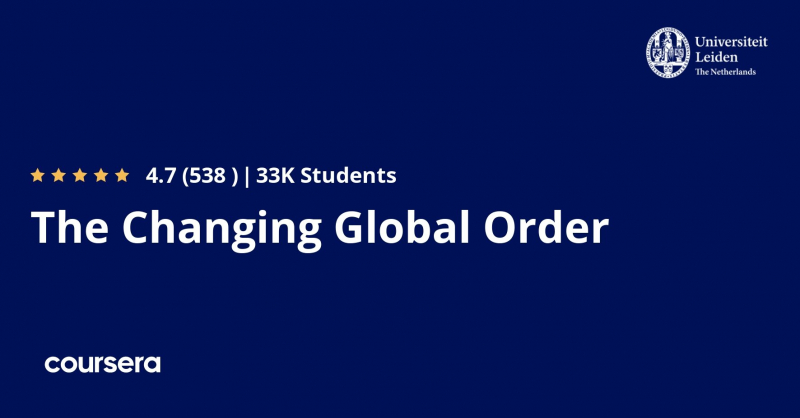
coursera.org 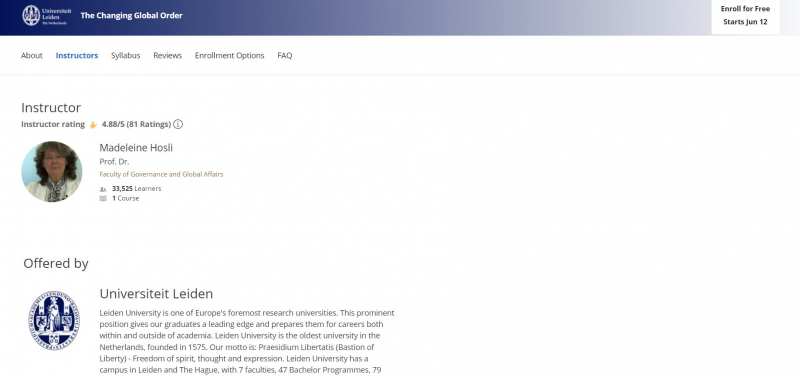
coursera.org -
Three of the most essential styles of thinking about the universe and human place in it are philosophy, science, and religion. Are these modes mutually exclusive? To put it another way, is it intellectually responsible to 'choose sides' and identify with one of these approaches over the others? Or are they mutually supporting or complementary? The devil, as is common in matters of this size, is in the details. It's crucial, for example, to figure out what makes each of these methods of thinking about the world unique. This course will assist you in studying what some of the contemporary major thinkers in philosophy, science, and religion are truly doing in order to acquire some clarity.
This course, named 'Philosophy and Religion,' is the second of three linked courses in the Philosophy, Science, and Religion Online series, and it will address key issues in the age-old conflict between science and religion, including:
- What kinds of conflicts do religion and science have?
- Is it possible to explain God away with today's cognitive science of religion?
- Why do some individuals refuse to believe in a God who created us in order for us to know him?
- Is scientific conviction a form of fundamentalism?
- What makes humans adept at acquiring, disseminating, and sharing knowledge? Is there a distinction when it comes to religious knowledge?
This course offers:
- Flexible deadlines: Reset deadlines in accordance to your schedule.
- Shareable Certificate: Earn a Certificate upon completion
- 100% online: Start instantly and learn at your own schedule.
- Beginner Level
- Approx. 24 hours to complete
- Subtitles: French, Portuguese (European), Russian, English, Spanish
Course ratings: 4.6/5
Enroll here: https://www.coursera.org/learn/philosophy-science-religion-2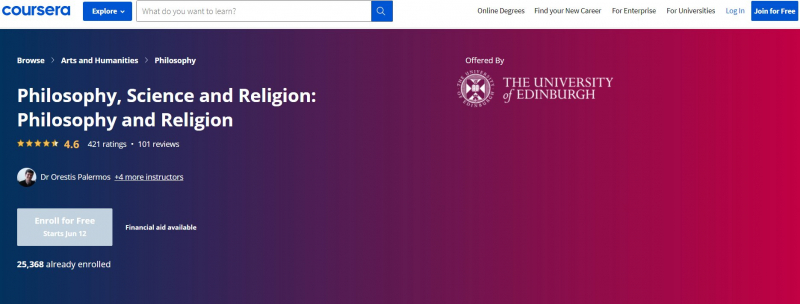
coursera.org 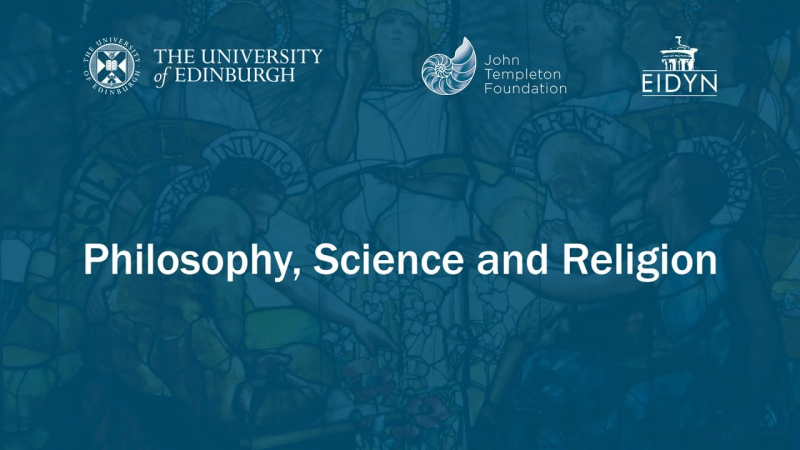
youtube.com -
According to mythology, two of the most important injunctions carved on the walls of the temple on the sacred site of Delphi in Ancient Greece were NOTHING IN EXCESS and KNOW THYSELF. This course will look at the latter injunction in order to figure out what self-knowledge is, why it is beneficial, and what, if any, restrictions it may have. What is lacking in a person who lacks self-awareness that makes her less intelligent, virtuous, or competent in some areas than others who do, and what, if anything, can she do to fill that gap? The examination will be informed by historical sources as well as modern research in philosophy, experimental social psychology, and neuroscience, during which you will become students of your own dreams and establish certain meditation techniques.
Learning Objectives: Learners will become familiar with key topics from Western, ancient Chinese, and Buddhist perspectives on self-knowledge. They will obtain an understanding of the relationship between self-knowledge and wisdom, the importance of intellectual humility, and non-introspective techniques of learning about oneself as a result of their efforts.Learners will also get familiar with current research on the emotions, the unconscious, the role of affect in decision making, and self-deception in experimental social psychology, philosophy, and neuroscience. They will also get an understanding of a challenge to the Buddhist tradition's concept of a cohesive, unified self.
This course offers:
- Flexible deadlines: Reset deadlines in accordance with your schedule.
- Shareable Certificate: Earn a Certificate upon completion
- 100% online: Start instantly and learn at your own schedule.
- Beginner Level
- Approx. 19 hours to complete
- Subtitles: Arabic, French, Portuguese (European), Italian, Vietnamese, German, Russian, English, Hebrew, Spanish
Course ratings: 4.6/5
Enroll here: https://www.coursera.org/learn/know-thyself-the-examined-life
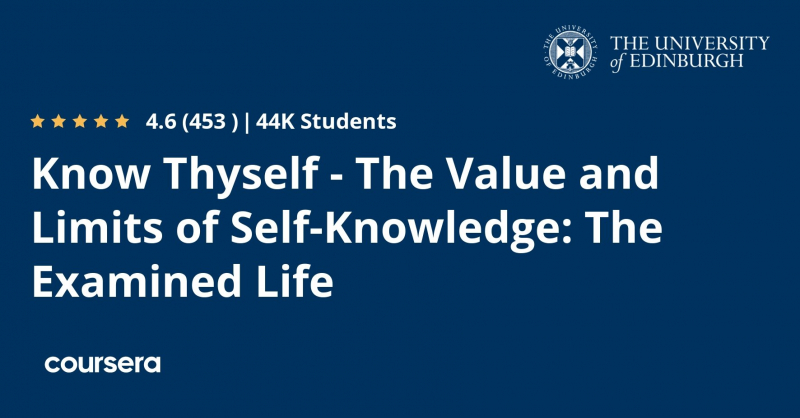
coursera.org 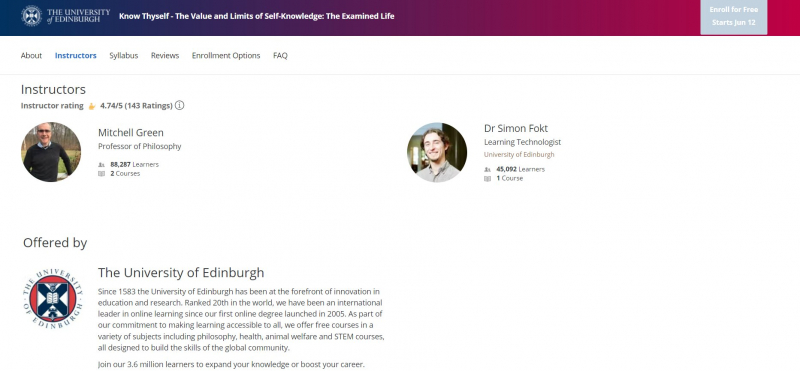
coursera.org -
When confronted with tough issues, individuals frequently reject and marginalize opposition. Political and moral conflicts can be extremely contentious, and even dangerous at times. Religious conversation is tainted by hubris, dogma, and ignorance, whether it's Christian fanaticism, Islamic extremism, or militant atheism. More people who are sensitive to both pro and con arguments for their beliefs, and who are prepared to accept the possibility that their political, religious, and moral beliefs are incorrect, are needed in the world. More intellectual humility is needed in the world.
But what exactly is intellectual humility? What makes individuals so drawn to intellectual arrogance? Answers are now being proposed by psychologists, philosophers, theologians, and educationalists.
This course will help you to define intellectual humility and intellectual virtues in general, as well as to answer the question of how to recognize someone who is modest. The course is structured around a number of interesting readings and practical assignments that will help you address issues related to humility in your daily life. All lectures are delivered by leading experts, and the course is organized around a number of interesting readings and practical assignments that will help you address issues related to humility in your daily life.
This course offers:
- Flexible deadlines: Reset deadlines in accordance with your schedule.
- Shareable Certificate: Earn a Certificate upon completion
- 100% online: Start instantly and learn at your own schedule.
- Intermediate Level
- Approx. 18 hours to complete
- Subtitles: French, Portuguese (European), Russian, English, Spanish
Course ratings: 4.6/5
Enroll here: https://www.coursera.org/learn/intellectual-humility-theory
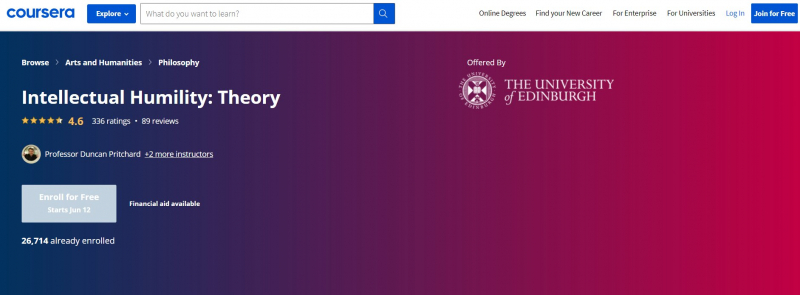
coursera.org 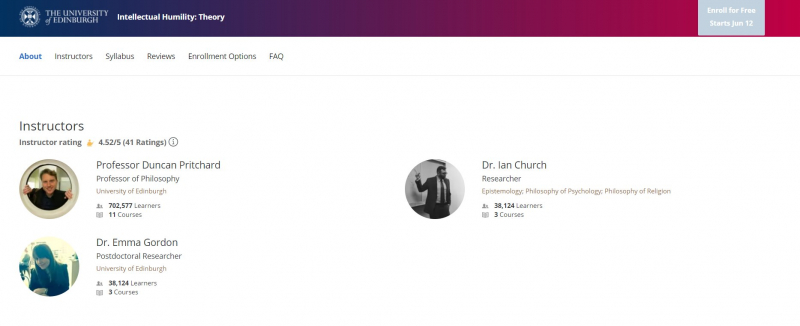
coursera.org -
Three of the most essential styles of thinking about the universe and the place in it are philosophy, science, and religion. Are these modes mutually exclusive? To put it another way, is it intellectually responsible to 'choose sides' and identify with one of these approaches over the others? Or are they mutually supporting or complementary? The devil, as is common in matters of this size, is in the details. It's crucial, for example, to figure out what makes each of these methods of thinking about the world unique. You'll look at what some of the contemporary major intellectuals in philosophy, science, and religion are actually doing in order to acquire some clarity.
The third of three connected courses in our Philosophy, Science, and Religion Online series is titled 'Religion and Science.' The course will cover five topics, each of which will be delivered by an expert in the field.
- Science, Religion, and the Origin of the Universe (Professor Tim Maudlin, NYU )
- Buddhism and Science (Professor Graham Priest, CUNY)
- Evolution and Design (Dr. Kevin Scharp, St Andrews)
- Sin Suffering and Salvation: Evolutions Thorny Issues (Dr. Bethany Sollereder, Oxford)
- Human Uniqueness in Science, Theology, and Ethics (Professor David Clough, Chester)
This course offers:
- Flexible deadlines: Reset deadlines in accordance with your schedule
- Shareable Certificate: Earn a Certificate upon completion
- 100% online: Start instantly and learn at your own schedule.
- Intermediate Level
- Approx. 26 hours to complete
- Subtitles: French, Portuguese (European), Greek, Russian, English, Spanish
Course ratings: 4.6/5
Enroll here: https://www.coursera.org/learn/philosophy-science-religion-3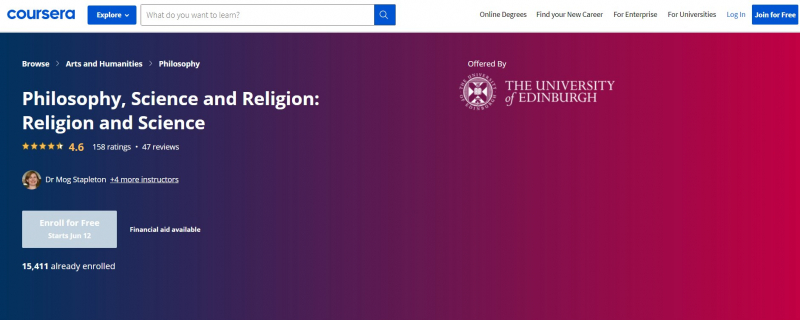
coursera.org 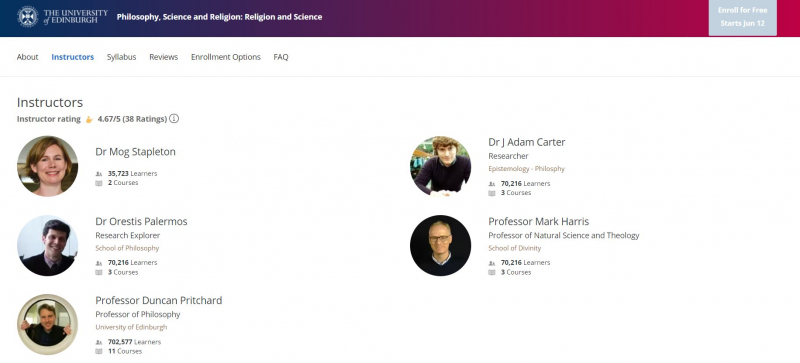
coursera.org -
Throughout history, the vast majority of people all across the world have thought they have a "soul", whatever that term means. While science cannot resolve the question of whether the soul exists, it can investigate the reasons and implications of diverse beliefs about the soul and its chances of surviving the death of the body. Why have soul and afterlife beliefs been so widespread throughout human history? Are there any adaptive benefits to believing in souls? Are there brain structures that have been molded by environmental influences that offer the foundation for many faiths' body/mind dualism? What impact do these ideas have on different cultures' worldviews and our collective lives? In religion, science, politics, and conflict, what role do complete afterlife views play? This course delves into numerous aspects of this little-studied yet vital part of the human mind and behavior.
The majority of the lectures are 70 to 80 minutes long and are often divided up into three segments. They were filmed during a Rutgers University School of Arts and Sciences course. Slides and video clips are included in these videos. Most lectures come with slides that are utilized during the presentation, as well as a suggested reading assignment that may provide extra chances for you to reflect on your studies. The online course has been divided into three sections due to the length and natural flow of this curriculum; this is Unit 1.This course offers:
- Flexible deadlines: Reset deadlines in accordance with your schedule.
- Shareable Certificate: Earn a Certificate upon completion
- 100% online: Start instantly and learn at your own schedule.
- Beginner Level
- Approx. 19 hours to complete
- Subtitles: French, Portuguese (European), Russian, English, Spanish, Romanian
Course ratings: 4.5/5
Enroll here: https://www.coursera.org/learn/soulbeliefs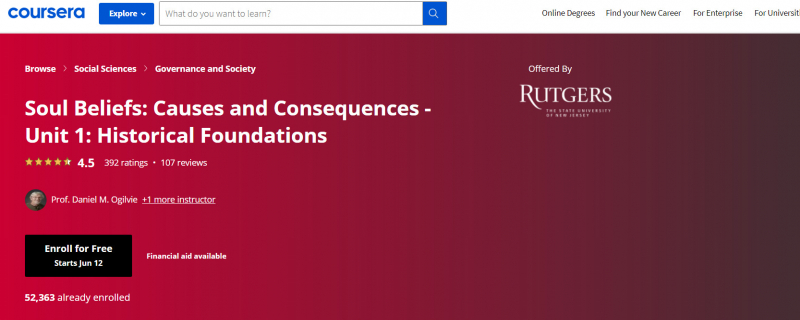
coursera.org 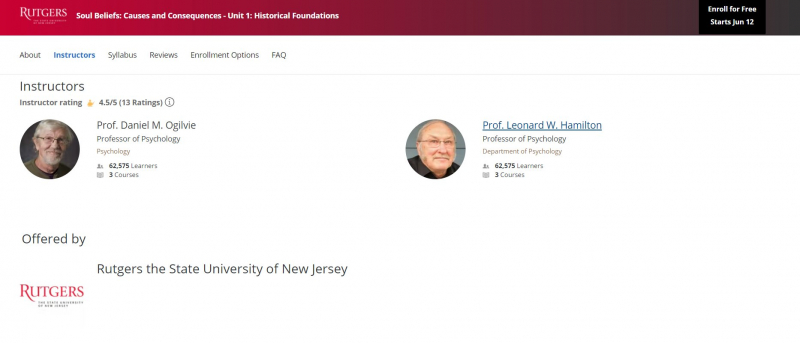
coursera.org -
Coexistence in Medieval Spain: Jews, Christians, and Muslims, one of the best online religion courses, examines the intercultural relations between Jews, Christians, and Muslims in Iberia from the Visigothic era (6th century CE) to the formation of Catholic Spain under Queen Isabel I and King Ferdinand II (late 15th century). This course examines the peninsula's many identities, including Christian Hispania, Jewish Sefarad, and Islamic al-Andalus. It traces the beginnings and progression of conflict between various groups (the Muslim conquest of Spain, Christian Reconquista, prohibitions blocking intermixing of peoples, and expulsions). It also aims to comprehend internal conflicts, such as difficulties between Christian Arian Visigoths and local Catholic Iberians, or the fundamentalist North African Almohad Dynasty, which rejected the Spanish Umayyad Caliphate's penchant for religious tolerance.
This course also looks at how different communities can work together and live in harmony. It delves into the unique role of the Jewish community, who served as political and cultural intermediates as well as intellectual collaborators for Muslims and Christians. You'll learn about people's attempts to develop and govern viable diverse communities throughout history. The Honors Track will use an investigative process ("The Historian's Craft") to explore this history, which will include watching, reading, analyzing, and reflecting on events, people, places, and artifacts.
This course offers:
- Flexible deadlines: Reset deadlines in accordance with your schedule
- Shareable Certificate: Earn a Certificate upon completion
- 100% online: Start instantly and learn at your own schedule.
- Beginner Level
- Approx. 27 hours to complete
- Subtitles: French, Portuguese (European), Greek, Russian, English, Spanish
Enroll here: https://www.coursera.org/learn/coexistence-in-medieval-spain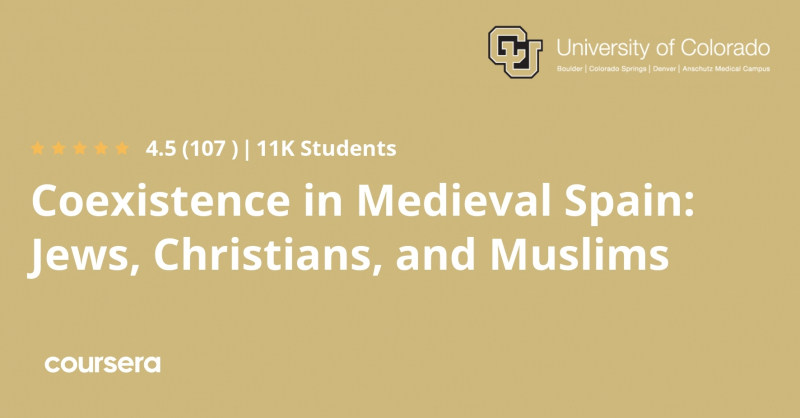
coursera.org 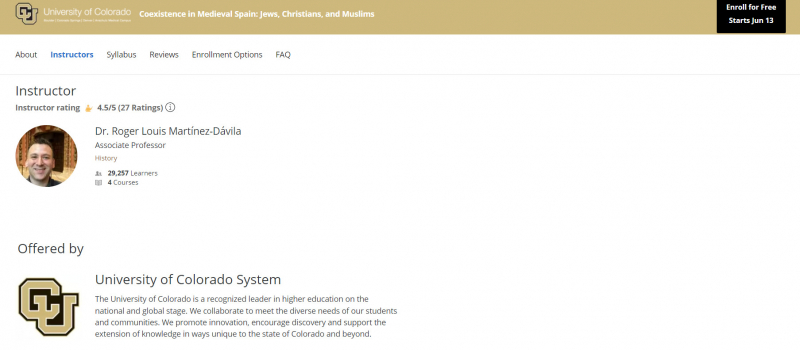
coursera.org















